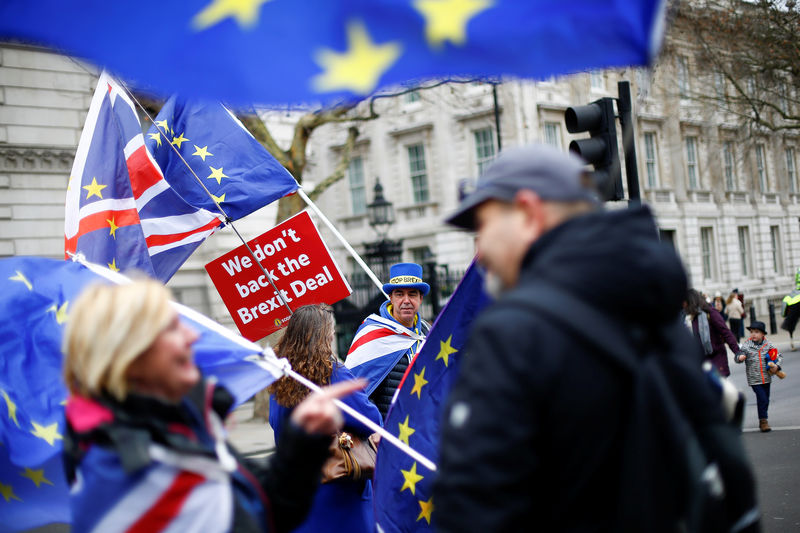(Bloomberg) -- Sign up to our Brexit Bulletin, follow us @Brexit and subscribe to our podcast.
The U.K. has a new referee who must keep order in its rowdy, divided and Brexit-battered Parliament.
Lindsay Hoyle has been elected as the new Speaker of the House of Commons, after promising to be an antidote to his predecessor John Bercow. Hoyle, 62, has never revealed his views on Brexit, while Bercow admitted he voted to stay in the European Union.
Hoyle, who was voted in as a Labour MP but will now renounce his party affiliation, won the contest on a promise to heal divisions over the U.K.’s divorce from the EU after one of the most bruising periods in recent British political history.
It was a message that appealed to weary politicians who have spent three years struggling to cope with the pressure of navigating the country’s exit from its closest trading bloc.
“I will be neutral. I will be transparent,” Hoyle said after winning the vote. “This house will change, but it will change for the better.”
The choice of speaker could be crucial to the future direction of Brexit if neither of the country’s main political parties wins a clear majority at the general election taking place on Dec 12.
Chairing debates in the Commons, it is the speaker who often determines what a minority government can and cannot do. Hoyle will potentially have the power to help rank-and-file members of Parliament take control of the House of Commons agenda from the government as well as ruling on the amendments they can make to government legislation.
Hoyle’s appointment comes after Bercow stepped down after 10 years in the job. Bercow, who was famous for his cries of "Order, order!" during chaotic parliamentary debates, was frequently controversial. He modernized the way the Commons worked and often sided with backbench politicians over the executive. He made it a central part of his remit to ensure members of Parliament had a say over the direction of Brexit.
That meant banning prime minister Theresa May from repeatedly trying to get MPs to vote for the same Brexit deal they had already rejected.
The most controversial speaker in decades, he became a lightning rod for Brexiteers, who saw him as part of an establishment conspiracy to delay or even stop departure from the bloc.
While Hoyle is a different character, his potential influence could be just as great.
After four rounds of voting on Monday, he won the support of 325 of the 540 MPs who took part, beating fellow Labour MP Chris Bryant in the final round.
Hoyle has been deputy speaker since 2010 and represented Chorley -- 300 miles north of London -- since 1997. Despite coming from a Brexit-backing constituency, he’s never revealed how he voted in the 2016 referendum.
In contrast to Bercow’s verbose and combative style, Hoyle has an avuncular manner and has used jokes to reduce tensions in Parliament. And after nine years as deputy speaker, he’s had time to think about the qualities needed to succeed in the top job.
“It’s about having humor, the skills and the ability to hold the House, and it’s about getting the temperature right,” Hoyle said in an interview with the Politics Home website in May. “It’s about complete fairness and independence.”
Despite having a softer approach than Bercow, Hoyle is no wallflower. During the 2013 Budget, he stole the show, keeping at bay the bellowing and barracking of MPs and accusing them of behaving like circus performers.
In his pitch to MPs ahead of Monday’s vote, he stressed the importance of accountability and reforming the legislature, saying he should be judged on his “proven track record” as deputy speaker. MPs shouldn’t be given preference just because they’ve been in the House for longer, he said.
With so many MPs stepping down over the abuse they have received, Hoyle said one of his first acts would be to call a summit of party leaders to find a way of taking the “nastiness” out of politics.
He was in the Speaker’s Chair during the terrorist attack on Westminster in 2017, and oversaw the subsequent suspension and lock down of Parliament. He said the security of MPs would be a priority of his time in the post.
Before becoming an MP, Hoyle ran his own textile and screen printing business and was first elected as a councilor at the age of 22. His father Doug, who was also a Labour MP and is now a member of the House of Lords, was in the public gallery to watch the announcement.
In his acceptance speech, Hoyle also paid tribute to his daughter Natalie, who died in 2017 at the age of 28. “I wish she’d been here. We all miss her,” he said. “She was everything to all of us.”
